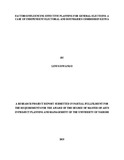| dc.description.abstract | This study sought to investigate the factors influencing effective planning for general elections in
Kenya a case of Independent Electoral and Boundaries Commission. The study was guided by
the following objectives; budget approvals, elections timelines, procurement procedures and
employees preparedness. This study was delimited on investigating factors influencing effective
planning for general elections a case of Independent Electoral and Boundaries Commission
Kenya. This research applied descriptive survey design. Primary data was collected through
questionnaires, targeting a study population of 900 employees working with IEBC. A sample
size of 90 respondents working at IEBC Head Office Anniversary Towers Nairobi Central
Business District was considered for this study. Random stratified sampling was used to pick the
90 respondents targeted in this study. Data was collected through a semi structured
questionnaires which were distributed to the targeted employees. Expert judgment from the
university supervisors was used to assess the extent of the items in the instruments, address the
objectives as well as whether the format of the instruments gave the correct impression. Split-
Half technique of reliability testing was employed, whereby the pilot questionnaires were
divided into two equivalent halves and then a correlation coefficient for the two halves computed
using the Spearman formula. Descriptive statistics, namely, frequency tallies and their
corresponding percentage scores and Pearson correlation coefficients, were used to analyze the
data, using statistical package for Social Sciences. Qualitative data was analyzed using narratives
statements based on the relevant thematic areas and the findings given in prose form.
The study concluded that back trimming of budget estimates affect the planning and
management decisions due to resource constraints and the fact that all commission activities
implementation are based on the approved budget. The study also concluded that budget plans
affects the commissions operation to a very greater extent. Timely procurement ensures timely
availability, orientation and training to the end users for effective delivery of elections. The study
also concluded that adequate and relevant trainings enhance the level of understanding of key
issues which result in better planning. This study recommends that IEBC should make to ensure
that budgets are approved on time. IEBC should prepare realistic budgets which are highly
prioritized and consult widely with National Treasury. IEBC officials should always adopt early
planning with the directorate as users, early release of funds, prioritizing activities meet
deadlines and by setting realistic timelines. IEBC should remain independent amidst all political
pressure in procurement.It should also lobby with the PPOA to amend some of the procurement
procedures in order to allow adequate time for appeal process. Also, ICT equipment should be
tested or procured two years before the election. This study also recommends that IEBC can
improve their employee’s capacity through; staff capacity building, refresher courses, skills
survey and task matching among staff and engaging all cadres in capacity building programmes.
Also, IEBC should also make it mandatory for staff to join professional bodies such as ICPAK | en_US |

